.JPG) |
| Coat of arms for student fraternity carved in wood Burschenschaft Germania |
Burschenschaft Germania zu Würzburg |
Heraldic coat of arms-shield
for student fraternity carved in wood
A unique project was delivered in the spring of 2018.
A rather
large heraldic sculpture in lime wood and this for a German student association
from Würzburg, a 'Burschenschaft'.
This unique
sculpture for Germania Burschenschaft Zu Würzburg was intended as a
commemoration of their 200th anniversary.
The commission
In the
autumn of 2016 I received the visit of Mr. Bussmann, the spokesman of
Burschenschaft Germania zu Würzburg, I had already had several times contact
with this pleasant man by phone and via email.
After some
negotiations about his specific wishes, the cost price, the dimensions of the
sculpture, technical details, the colour determination and not unimportant, the
delivery date, this resulted in an agreement.
Design heraldic coat of arms
As we have
discussed a number of times in this blog, a beautifully executed carving always
starts with a beautiful and well thought-out design. Designs sent by the
client(s) cannot always serve as a blueprint for the execution in wood. The
heraldist who makes paper designs does not need to take into account the logic
so that it can be executed in wood.
Also in
this case, a new design was definitely recommended. In consultation with Mr.
Bussmann was opted for a heraldic coat of arms in wood that looks at you, a
heraldic term for a heraldic coat of arms whose helmet looks at you frontally.
The heraldic colours as on the already submitted designs had to remain correct and preferably the same. After a number of preliminary designs, a beautiful baroque design emerged.
But what is a Burschenschaft?
For the
blog reader who does not know exactly what Burschenschaften are, here is a
brief explanation. These traditional German student associations have their
origins in the *Urburschenschaft of Jena from 1815.
The name Burschenschaft comes from Bursche, which means boy or student in the German language. The Burschenschaften were based on liberal and patriotic ideas. "Burschenschaft" is, however, only used by a small proportion of very different German student associations today.
Only 300 of the 1500-2200 student associations in the German language area can be called a "Burschenschaft". In public, the term is often wrongly used as a collective term for all student associations.
Most student associations that
are not Burschenschafts have historically no connection with the
Burschenschaften and have a completely different organisation.
In particular, some members of the largest umbrella organisation of Burschenschaften (Dachverband), the Deutsche Burschenschaft, have a political functioning for historical reasons.
Traditionally oriented student associations are therefore nowadays - and not always unjustly - considered by public opinion in the German-speaking world as politically right-wing to extreme right-wing, often to their dismay. For example, the Corps (the oldest form of student union) explicitly does not want to be considered part of the Burschenschaften.
 |
| Burschenschaft Germania zu Würzburg, Germany, Fraternity House |
Remarkable
!
The
mensuration (Wikipedia)
A striking
feature of the Burschenschaft is the academic duelling or academic fencing,
also called the mensuration (mensur in German).
Modern
academic fencing cannot be fully described as a duel nor as a sport. It is a
way of training character and forming personality in the Corps student. There
is no official winner at a Partie (fight), although one can usually recognise
the better participant (called Paukant). Battles were also often held in the
past with the aim of restoring honour or safeguarding it (e.g. in the case of
an insult).
Mensuration
clearly differs from the better known sports fencing. The opponents stand at a
fixed distance from each other, which also explains the word mensuration
("measurement"). In sports fencing, movement is allowed while the
mensuration is more static. The performers of the academic fencing art fight
with stretched arms and try to hit the unprotected parts of the opponent's head
and face.
 |
| Mensur |
During the fight, it is not permitted to dodge blows or protect one's own face with arms or hands in order to avoid injuries. Because of the fixed distance between the participants, it is only possible to hit certain spots on the head of the opponent. When dodging (the so-called Mucken) or self-protection by means of the arms, the distance is reduced, which can cause more serious wounds.
The strictly measured distance (a sword length or a blade length depending on the local rules or Fechtkomment) is thus a kind of protection and is the origin of the word mensuration (measurement). The opponents are, as it were, perfectly 'measured' for each other in terms of distance, as well as height, weight, age and mensuration experience.
At each competition (Partie), there are usually one or two doctors present (sometimes also a medical student). Each competitor used to have his own doctor to administer care after the fight, but nowadays one supervising (certified) doctor (Paukarzt) is used. The doctors can also end the duel depending on the nature of any injuries. Wounds are often stitched on the spot, usually without anaesthetic.
Heraldic coat of arms for student association in wood
Burschenschaft Germania Zu Würzburg celebrated its 200th anniversary in 2018 by having their personal heraldic coat of arms carved in wood as a memento. It is the first time I had the honour of carving a heraldic coat of arms for a student association. This oversized coat of arms was made of lime wood and is about 1.20 metres high with the correct heraldic colours.
When the coat of arms was inaugurated in the spring of 2018, and I was confronted with the spatial dimensions of the student house (Verbindungshaus), it seems that the whole could have been a bit bigger. The Verbindungshaus of Germania Würzburg is a beautiful 18th-century villa just outside Würzburg, and lies on slopes of Main between vineyards and historical sites such as the Wallfahrtskirche Käppele and Festung Marienberg.
The view of Würzburg from the terrace of the student house is stunning.
Some
pictures of the room where my heraldic sculpture is exhibited. I wish them and
future generations much pleasure with their purchase.
Here are some pictures of the creation of this sculpture.
The Project
.JPG) |
| Fraternity Germania zu Würzburg |
 |
| Fraternity Germania zu Würzburg |

.jpg)

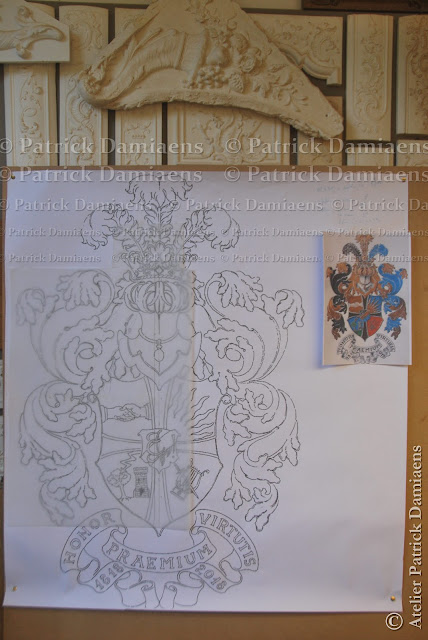



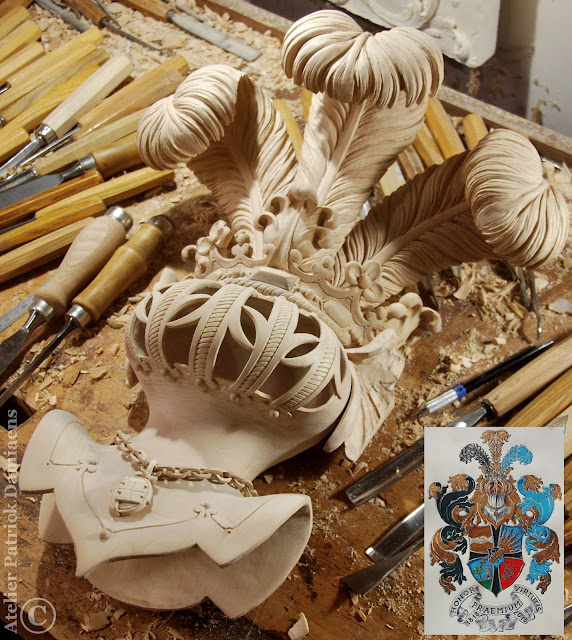









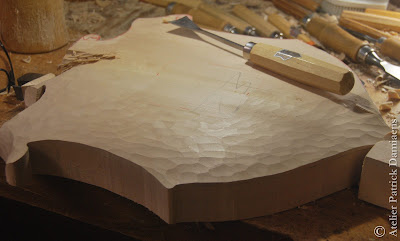


















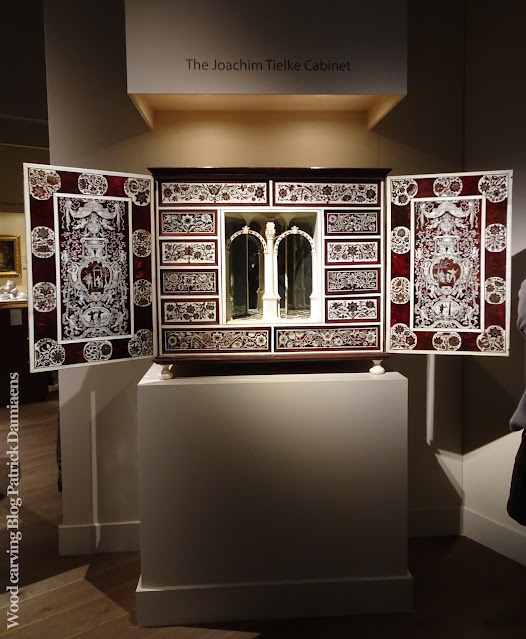



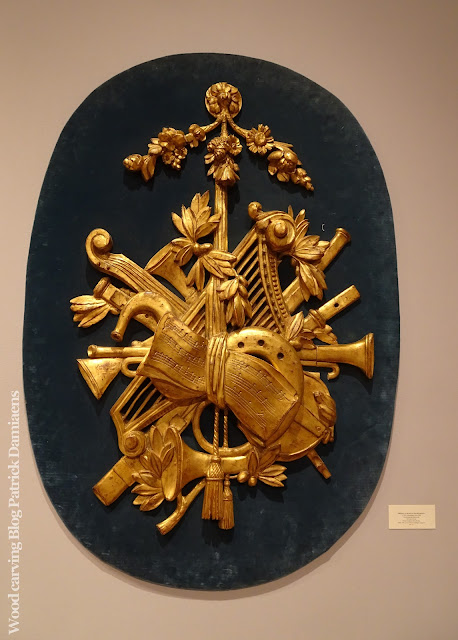























.jpg)